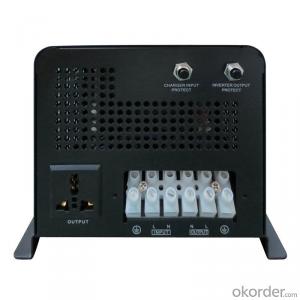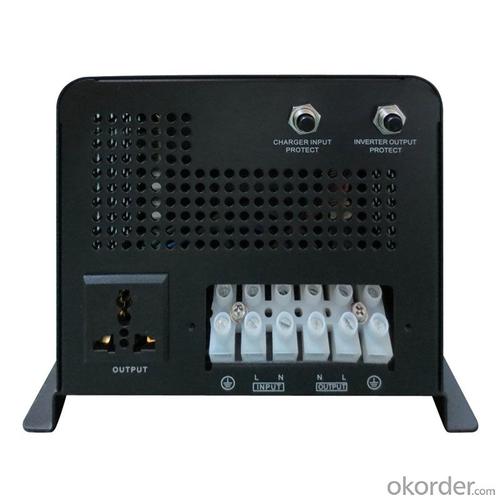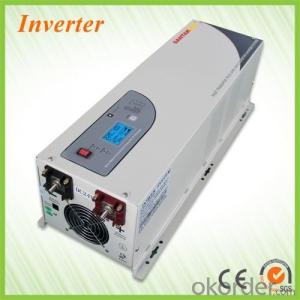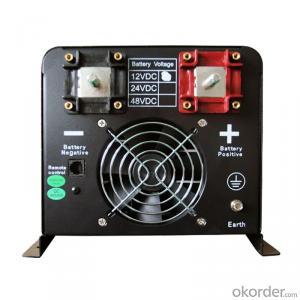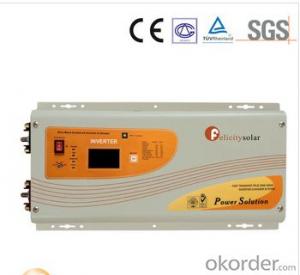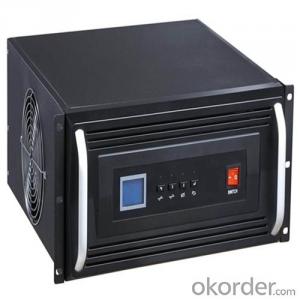3kw Solar Inverter Price Pure Sine Wave Inverter 48V 6000W 2024 Top Selling South Africa EP 3000 SeriesWave Inverter
- Loading Port:
- China main port
- Payment Terms:
- TT OR LC
- Min Order Qty:
- 100 pc
- Supply Capability:
- 1000 pc/month
OKorder Service Pledge
OKorder Financial Service
You Might Also Like
EP3200 series inverter adopt very new model copper transformer so the efficiency reach to 90% and lower consumption (NEW !)
Pure sine wave solar hybrid inverter for solar system and home appliances . EP3200 series developed on the base of our very popular EP3000 series . EP3200 has achieved significant improvements on battery charging , AC transfer , bypass etc .
By adopting DIP(Dual-in-line) switch , EP3200 series inverter provides more smarter options for users to customize the performance of the device . Main for home solar system including air conditioner , refrigerator , washing machine , water pump , fans , tv , lights etc .
Features :
1. High overload ability of our EP3200 charger is up to 300% rated power
2. EP3200 pure sine wave inverter adopts low quiescent current, and power saver mode to reduce power consumption to 3W . It can extract max. power from various batteries with different protections, and low voltage trip can be selected (10V/10.5V/11V).
3. Uses PFC (power factor correction) for charger, which has less power consumption than conventional units.
4. It has 10s delay before transfer when AC resumes, and overload protection when our APC pure sine wave inverter equips with generator.
5. 10ms typical transfer time between battery and AC, which guarantees power continuity of EP3200 charger. Uses selectable input AC voltage (185-265V or 155-255V) for different kinds of loads.
6. Our EP3200 charger allows start up and through power with depleted batteries. Its powerful charge rate up to 70Amp.
7. It can offer 3-step intelligent battery charging, and equipped with 6 preset battery type selector for totally flat batteries.
8. LCD status display, battery/AC priority switch, RS232 communication port are available for our EP3200 pure sine wave inverter, it also has 17 alarms/warnings for easier operation and trouble-shooting, and ability to switch the unit on/off. In addition, select/deselect power saver mode can be used too.
| Rated Capacity | 4000W | 5000W | 6000W | |
| Efficiency | >90% | |||
| Input | ||||
| Model | 120v Models | 230v Models | ||
| Nominal Voltage | 100V/110V/115V/120VSelectable | 200V/220V/230V/240V Selectable | ||
| Output | ||||
| Rated Power | 4000W | 5000W | 6000W | |
| Output Voltage | 100V/110V/115V/120V Selectable | 200V/220V/230V/240V Selectable | ||
| Voltage Waveform | Pure Sine Wave | |||
| Crest Factor | 3:1 | |||
| Transfer Time | Transfer Time : AC To DC : 10ms (Typical) Transfer Time : DC To AC : 10ms(Typical ) | |||
| Max Bypass Overload Current | 30A | |||
| Input | ||||
| Nominal Voltage | DC24V/48V | DC48V | DC48V | |
| Over Current Protection | By Re-Settable Over Current Protector | |||
| Output | ||||
| Regulation (Nominal) | ±10% Typical Of Nominal Voltage | |||
| Nominal Input Voltage | 230Vac | |||
| Input Voltage Range | 185-265Vac | |||
| Nominal Output Voltage | According To The Battery Type | |||
| Nominal Charge Current | 30Amp-70Amp | |||
| Battery Type | Lead-Acid 12Ah ~ 250Ah | |||
| Typical Backup Time | No Limit | |||
| Charging Method | Smart Pulse Charging With Two Charging Modes: Quick Charging When Battery Is Not Fully Charged, Trickle Charging When Battery Is 90% Fully Charged. | |||
| Average Charging Current | 65A/35A | 70A/40A | 50A | |
| Battery Voltage options | ||||
| Options 7 | Battery low trip to bypass 11v , high trip to battery 14v | |||
| Options 8 | Battery low trip to bypass 10.5v , high trip to battery 13.5v | |||
| Options 9 | Battery low trip to bypass 10v , high trip to battery 13v | |||
| Communications & Management | ||||
| Control Panel | LCD/LED Option | |||
| Audible Alarm | Alarm On Battery: Low Battery & Battery Over Voltage Alarm On Abnormal Operation: Over Load, Short-Circuit, & Over Heat | |||
| Environment And Safe | ||||
| Operating Temperature | 0℃ To 40℃ (32℉ To 104℉) | |||
| Transit/Storage Temperature | -15℃ To 60℃ | |||
| Audible Noise | 60 Dba Max at 1m | |||
| Quality Control System | ISO 9001,FCC,CE | |||
| Physical | ||||
| Dimensions: (H×D×W) | 755*320*310mm | |||
| G.W (Kg) | 37.5 | 47.5 | 47.5 | |
| Packing | Export Carton For Each Unit Per Carton | |||
| Rated Capacity | 4000W | 5000W | 6000W | |
| Efficiency | >90% | |||
| Input | ||||
| Model | 120v Models | 230v Models | ||
| Nominal Voltage | 100V/110V/115V/120VSelectable | 200V/220V/230V/240V Selectable | ||
| Output | ||||
| Rated Power | 4000W | 5000W | 6000W | |
| Output Voltage | 100V/110V/115V/120V Selectable | 200V/220V/230V/240V Selectable | ||
| Voltage Waveform | Pure Sine Wave | |||
| Crest Factor | 3:1 | |||
| Transfer Time | Transfer Time : AC To DC : 10ms (Typical) Transfer Time : DC To AC : 10ms(Typical ) | |||
| Max Bypass Overload Current | 30A | |||
| Input | ||||
| Nominal Voltage | DC24V/48V | DC48V | DC48V | |
| Over Current Protection | By Re-Settable Over Current Protector | |||
| Output | ||||
| Regulation (Nominal) | ±10% Typical Of Nominal Voltage | |||
| Nominal Input Voltage | 230Vac | |||
| Input Voltage Range | 185-265Vac | |||
| Nominal Output Voltage | According To The Battery Type | |||
| Nominal Charge Current | 30Amp-70Amp | |||
| Battery Type | Lead-Acid 12Ah ~ 250Ah | |||
| Typical Backup Time | No Limit | |||
| Charging Method | Smart Pulse Charging With Two Charging Modes: Quick Charging When Battery Is Not Fully Charged, Trickle Charging When Battery Is 90% Fully Charged. | |||
| Average Charging Current | 65A/35A | 70A/40A | 50A | |
| Battery Voltage options | ||||
| Options 7 | Battery low trip to bypass 11v , high trip to battery 14v | |||
| Options 8 | Battery low trip to bypass 10.5v , high trip to battery 13.5v | |||
| Options 9 | Battery low trip to bypass 10v , high trip to battery 13v | |||
| Communications & Management | ||||
| Control Panel | LCD/LED Option | |||
| Audible Alarm | Alarm On Battery: Low Battery & Battery Over Voltage Alarm On Abnormal Operation: Over Load, Short-Circuit, & Over Heat | |||
| Environment And Safe | ||||
| Operating Temperature | 0℃ To 40℃ (32℉ To 104℉) | |||
| Transit/Storage Temperature | -15℃ To 60℃ | |||
| Audible Noise | 60 Dba Max at 1m | |||
| Quality Control System | ISO 9001,FCC,CE | |||
| Physical | ||||
| Dimensions: (H×D×W) | 755*320*310mm | |||
| G.W (Kg) | 37.5 | 47.5 | 47.5 | |
| Packing | Export Carton For Each Unit Per Carton | |||
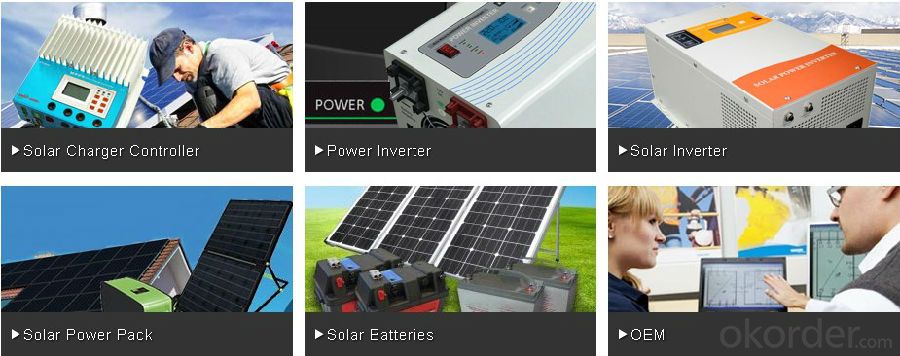
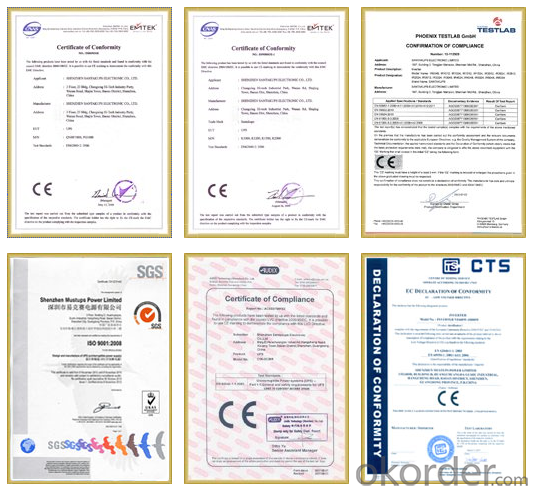
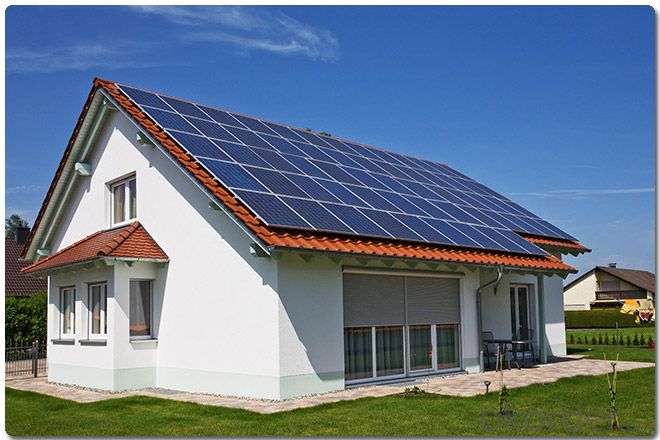
Warrenty
provides a 1~3 year limited warranty (“Warranty”) against defects in materials and workmanship for its Uninterruptible power supply, Power inverter/chargers, Solar charge controllers, Battery Products (“Product”).
The term of this Warranty begins on the Product(s) initial purchase date, or the date of receipt of the Product(s) by the end user, whichever is later. This must be indicated on the invoice, bill of sale, and/or warranty registration card submitted to MUST-Solar. This Warranty applies to the original MUST-Solar Product purchaser, and is transferable only if the Product remains installed in the original use location.
FAQ
1. How do I decide which system is right for me ?
For protection from long outages, include a generator or solar panels in your Must solar system. Shorter outages can be handled by a battery-only system.
2. Where my system will be installed ?
Must solar systems are usually wall-mounted near a home's main electrical (circuit breaker) panel.
3. How do I install my system ?
A must solar backup inverter is connected to a home electric system , we will supply detailed installation manual and videos for our customers .
- Q: How do you connect a solar inverter to a data monitoring system?
- To connect a solar inverter to a data monitoring system, you need to follow a few steps. First, ensure that your inverter is compatible with the data monitoring system you intend to use. Then, connect the inverter to your local network using an Ethernet cable or wireless connection. Next, access the inverter's settings through a web interface or mobile app and enable data monitoring. Finally, input the necessary information, such as IP addresses or log-in credentials, into the data monitoring system to establish the connection between the inverter and the monitoring platform.
- Q: What is the efficiency of a solar inverter?
- The efficiency of a solar inverter refers to the percentage of solar energy that is converted into usable electricity. It is an important factor as higher efficiency means more energy is produced, reducing the overall energy loss. The efficiency of a typical solar inverter ranges from 95% to 98%, with some advanced models even surpassing 99%.
- Q: Can a solar inverter be used in areas with high levels of electromagnetic interference (EMI)?
- Yes, a solar inverter can be used in areas with high levels of electromagnetic interference (EMI). However, it is important to ensure that the inverter is designed and equipped to handle such conditions. Certain models of solar inverters are specifically designed to mitigate the effects of EMI and provide reliable performance even in challenging electromagnetic environments.
- Q: Can a solar inverter be used with different types of solar panels (monocrystalline, polycrystalline, thin-film)?
- Yes, a solar inverter can be used with different types of solar panels, including monocrystalline, polycrystalline, and thin-film. The key factor is that the solar panels need to have compatible voltage and current ratings with the inverter. As long as the specifications match, the inverter can efficiently convert the DC power generated by any of these solar panel types into usable AC power for various applications.
- Q: How does a solar inverter protect against overvoltage and overcurrent?
- A solar inverter protects against overvoltage by continuously monitoring the voltage levels of the solar panels and adjusting the conversion process to ensure that the output voltage remains within a safe range. In case of overvoltage, the inverter automatically reduces the power output or shuts down to prevent damage to the system. Similarly, the inverter safeguards against overcurrent by constantly monitoring the current flowing through the system. If the current exceeds the safe limits, the inverter utilizes protective measures such as reducing the power output, regulating the current, or triggering a shutdown to prevent any potential damage to the solar panels or connected devices.
- Q: Can a solar inverter be used with different monitoring platforms?
- Yes, a solar inverter can be used with different monitoring platforms as long as the monitoring platforms are compatible with the inverter's communication protocols and data formats.
- Q: Can a solar inverter be used with different solar panel technologies?
- Yes, a solar inverter can be used with different solar panel technologies as long as the inverter is compatible with the specific voltage and power output of the panels. However, it is important to ensure that the inverter is designed to handle the specific characteristics and requirements of each solar panel technology for optimal performance and efficiency.
- Q: How does a solar inverter handle voltage rise in case of low load conditions?
- A solar inverter handles voltage rise in case of low load conditions by reducing the power output from the solar panels. It does this by adjusting the voltage and frequency of the electricity generated, ensuring that the voltage remains within the acceptable range. This prevents any damage to the inverter or connected devices and ensures the efficient operation of the solar system.
- Q: Can a solar inverter be used in areas with high electromagnetic radiation?
- Indeed, a solar inverter is suitable for use in regions with abundant electromagnetic radiation. Nonetheless, it is crucial to acknowledge that the inverter's performance and reliability could potentially be impacted by the presence of such radiation. The existence of elevated radiation levels has the potential to induce electromagnetic interference (EMI), thereby causing disruptions in the inverter's operation and leading to decreased efficiency or even complete failure. Consequently, it is highly recommended to adopt necessary precautions, including implementing proper grounding and shielding techniques, as well as selecting inverters equipped with robust EMI protection mechanisms when installing solar inverters in areas with high electromagnetic radiation. Furthermore, seeking guidance from experts or manufacturers who possess knowledge regarding specific solar inverter models designed to endure and excel in environments characterized by high electromagnetic radiation is strongly advised.
- Q: Can a solar inverter be used in extreme weather conditions?
- Yes, solar inverters are designed to withstand a wide range of weather conditions, including extreme heat, cold, humidity, and even harsh environmental factors. They are built to be durable and reliable, ensuring their functionality and performance in various climates and weather conditions.
Send your message to us
3kw Solar Inverter Price Pure Sine Wave Inverter 48V 6000W 2024 Top Selling South Africa EP 3000 SeriesWave Inverter
- Loading Port:
- China main port
- Payment Terms:
- TT OR LC
- Min Order Qty:
- 100 pc
- Supply Capability:
- 1000 pc/month
OKorder Service Pledge
OKorder Financial Service
Similar products
Hot products
Hot Searches
Related keywords
